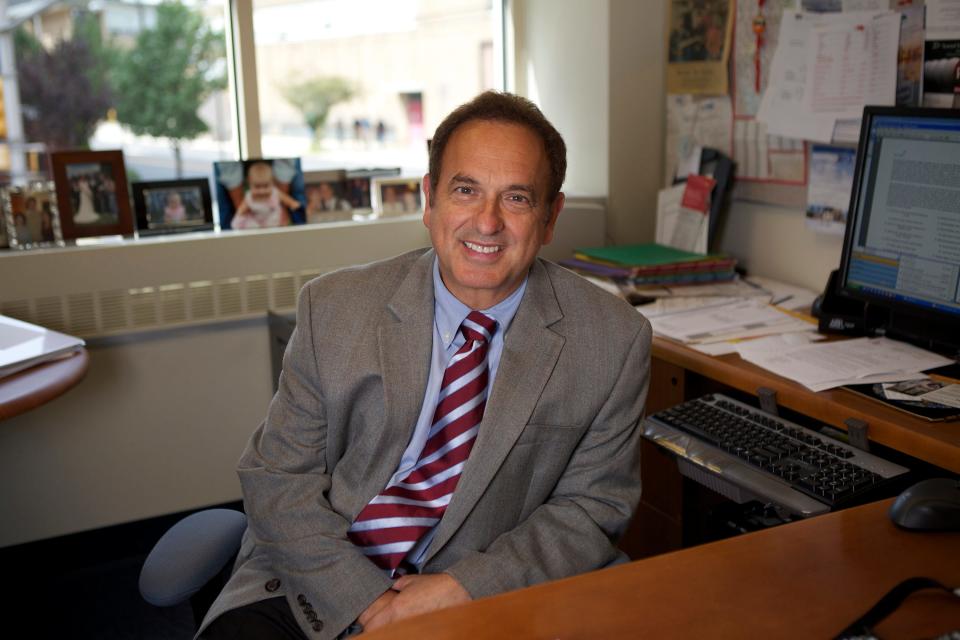'Your life is not over': Freehold mom fought off breast cancer while pregnant
In the span of a few crazy weeks, 32-year-old Freehold Borough resident Rebecca Swamy received news she’d been hoping for and news she’d been dreading.
She was pregnant — and she had breast cancer.
“It was really overwhelming,” Swamy said. “I was having so many ultrasounds of my lump, I still hadn’t had an ultrasound of the baby.”
After missing some obstetrician appointments because of conflicts with her cancer care, she asked one ultrasound technician who was imaging her chest if they could just sneak one in of the baby (alas, the answer was no).
“I have never been happier to have a good support system,” Swamy said. “I don’t think I could have done it without them.”
Brick mom with cancer: 'I felt a lump. But I didn't think anything of it'
Swamy’s odyssey included surgery, childbirth, radiation, a recurrence, and then an emerging form of treatment known as proton therapy. As Breast Cancer Awareness Month winds down, she has a message to share for everyone touched by the disease — especially new and expectant mothers.
“Just because you get diagnosed with breast cancer, your life is not over,” she said. “I am pretty much living a normal life.”
An innovative treatment
Swamy, who teaches fifth grade and special education at Farmingdale Elementary School, gave birth to son Shay in September 2016.
“As bad as it was, being pregnant maybe helped a bit because we have this other thing to focus on,” she said. “We don’t have time to be sad or depressed.”
Two days after taking Shay home, she went back to the hospital to begin traditional radiation therapy — a treatment she underwent every day for nearly eight weeks.
“The main side effect of radiation is fatigue, and they (doctors) kept asking, ‘Are you fatigued?’” she recalled. “I was like, ‘I have newborn who doesn’t sleep.’”
Cancer and pregnancy:After cancer diagnosis, Brick woman's sister serves as surrogate
Swamy got through it with the help of her husband Naveen and returned to teaching in January 2017. In 2019, she felt another lump. The cancer had returned — in her breast bone.
Dr. Bruce Haffty, director of radiation oncology at RWJBarnabas Health and associate vice chancellor for cancer programs at Rutgers Cancer Institute of New Jersey, recommended a different form of radiation therapy — proton therapy. Proton therapy delivers a beam of energy that can be more precisely targeted than X-rays used in traditional radiation therapy, allowing other tissues around the tumor to avoid extra exposure to radiation.
“Protons have been around for probably 20-plus years, and have become a little bit more popular in the last 10 years or so,” Haffty said. “We have a proton beam unit that we got within the last 10 years (at Robert Wood Johnson University Hospital). Protons sometimes have an advantage in that there’s less overlap with previous radiation. In her case, we were able to deliver it right to the spot without causing any overlap to the previous radiation area near the heart and lung.”
As opposed to the daily regimen Swamy endured the first time, proton therapy required just three hospital visits.
“Completely different,” Swamy said. “It had great success. As soon as we did the (follow-up) scan, there was no active cancer. It was much more efficient from my point of view. There was no overlap, which would have been risky for me. Overall there were less side effects, I would say for sure.”
Get checked:Here's where to get free breast cancer screenings across New Jersey this month

'I am doing really well'
How much promise does proton therapy have as a less-debilitating way of treating breast cancer and other cancers?
“There’s continual research going on to try to determine where it may benefit,” Haffty said. "There are other studies looking at certain lung cancers where protons have an advantage, head and neck cancers, a study looking at brain cancer, pediatric cancers, where kids are still growing.”
It was ideal for treating Swamy’s recurrence.
“It was very isolated in just one spot,” Haffty said.
Local care:New cancer treatments coming to Jersey Shore University Medical Center in Neptune
Shay is 6 years old now, and in first grade. Rebecca, now 39, is on a therapeutic dose of hormonal chemotherapy and will be for the rest of her life. But she’s relishing motherhood and still teaching, which is her passion.
Today’s lesson: She overcame breast cancer while becoming a mother; others can, too.
“Obviously there were hurdles, but I feel good,” she said. “I got the worst news and I am doing really well.”
Jerry Carino is community columnist for the Asbury Park Press, focusing on the Jersey Shore’s interesting people, inspiring stories and pressing issues. Contact him at jcarino@gannettnj.com.
This article originally appeared on Asbury Park Press: Breast cancer and pregnancy: How proton therapy helped Freehold NJ mom

